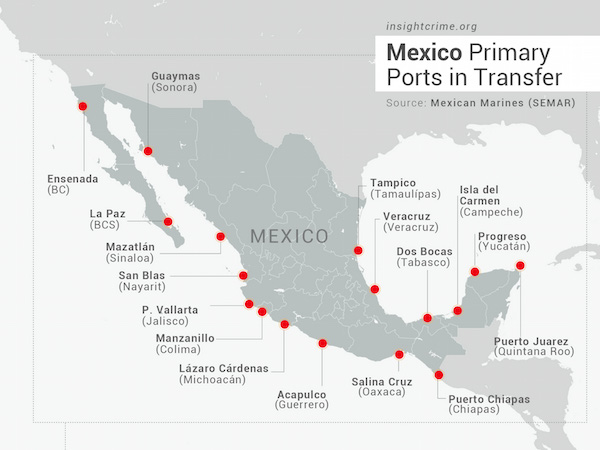Mexico's Marines will regain control of the country's 103 ports on June 17, after a hiatus of 41 years. The move is a worrying sign that ports are out of control, but militarization has yet to become a panacea for any of this country's organized crime issues.
Among other things, the Navy Secretariat (La Secretaría de Marina - SEMAR) will assume all security functions of the ports, while the Secretariat of Communications and Transportation (Secretaría de Comunicaciones y Transportes - SCT) will be in charge of all economic aspects.
In addition to maritime and port security, SEMAR will also authorize the arrival and departure of vessels, and inspect and certify Mexican and foreign vessels.
The Marines assumed control of the ports after their creation in 1821 and maintained that control until 1977 when Mexican President José López Portillo reformed the Organic Law of Public Federal Administration (Ley Orgánica de la Administración Pública Federal), which put the SCT in charge of the construction of port infrastructure, its administration, operation and security.
That was upended again in 2016, when Mexico's Senate approved reforms allowing the Navy to take back control of the country's ports and reconfigure efforts between SEMAR and the SCT to "reinforce security in the country's ports and coasts," Proceso reported.

InSight Crime Analysis
The decision by the government seems to obey two trends: 1) the ports are sieves through which all measures of contraband, drugs and weapons pass; 2) the Marines have become one of the most trustworthy institutions fighting criminal groups.
In the Navy's absence, Mexico's ports have become an increasingly attractive place for organized crime groups and their illegal activities.
Mexican Navy Admiral Vidal Francisco Soberón Sanz told El Universal that Mexico's ports have faced problems with organized crime, drugs, human, money and weapons trafficking "for 20 or 25 years."
To compound the problem, the ports have been neglected. A combination of operating with a small budget, insufficient personnel and inadequate equipment has caused the ports to be largely ineffective in thwarting illicit activities, Soberón Sanz told El Universal.
Jaime López, a security policy consultant and former police official, told InSight Crime in an email that returning the ports to the Navy is part of the larger trend of "strengthening and broadening its [the Navy's] role in national and public security."
And in the short-term, lawmakers argued that SEMAR's infrastructure and experience, in addition to their resources, will make an immediate impact.
However, regaining control will be no easy task. The Pacific maritime trafficking route has been identified as the preferred route for drug traffickers. In particular, the port of Manzanillo in the state of Colima and the port of Lázaro Cárdenas in the state of Michoacán are two of Mexico's most problematic ports on this route, which accounted for the transportation of the most cocaine and marijuana in 2016, according to seizure records from the Mexican Navy analyzed by El Financiero.
Indeed, according to statistics from the Tax Administration Service (Servicio de Administración Tributaria - SAT), about one-sixth of all drug seizures happen at Manzanillo and Lázaro Cárdenas ports. And seizures more than tripled in 2016, compared to 2015: the Navy decommissioned more than 13 tons of cocaine in 26 total drug seizures, 24 of which were made in the Pacific.
The biggest apparent mover of these drugs is the Jalisco Cartel - New Generation (Jalisco Cartel - Nueva Generación - CJNG). The CJNG is thought to control Mexico's "methamphetamine corridor," an area that includes the Pacific ports of Lázaro Cárdenas and Manzanillo, Mexican security analyst Alejandro Hope told Vice News.
The CJNG has also been expanding across the country as the Sinaloa Cartel has been weakened by an internal power struggle caused by the recapture and extradition of their former leader Joaquín "El Chapo" Guzmán. And in January, the CJNG was linked to the discovery of 12 mutilated corpses outside the port city of Manzanillo, another possible sign of their expansion.
But the CJNG is facing resistance. In 2015, the head of the Port Captaincy of Lázaro Cárdenas, José Luis Corro Chávez, was murdered outside of his home. He had allegedly been trying to regain control over the port, according to Vice News.
What's more, while the Mexican population has identified the marines as among the highest-rated public security institutions, it has also been accused of corruption within its ranks.